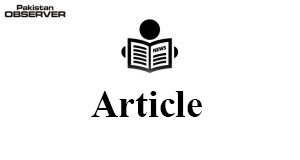NAGHMANA ZAFAR
CONTRIBUTION of Sindh fisheries is immense when compared to Balochistan, despite the fact that Makran coast is considerably longer then coastal belt of Sindh. Karachi, beingthe only developedmaritime hub along the coast, houses the largest and the oldest fisheries community. Therefore, seafood industry, researchers and maritime businesses have been concentrated in and around the coastal areas of Karachi, making it the most suitable district for progress of marine fisheries. But while listening to fishermen Community of Baba or Bhit Island near Karachi coast, one can clearly comprehend that there is a huge communication gap between fishers and all other stakeholders, whether they are policy makers, scientists or government officials. They all are working in silos and sadly unable to educate common fishers about progressive fishing ideas. It is therefore that knowhow about preservation of marine resources and modern fishing trends; is very low amongst the small scale fishers community. It is commonly believed that implementation of regulatory frameworks, IUU fishing, as well as human induced environmental issues resulting into depletion of fish stocks are some serious challenges faced by the fisheries sector in Sindh. However, the interactions with the representatives of Baba Island, Bhit Island, Khada market and Younasabad revealed that the issues of fishermen are different than that of policy makers and government officials. They are least concerned about the global fishing standards and growing competition between various seafood exporting states for improved product quality. In fact, poor socio-economic conditions, financial equity, access to the better local markets and basic health and education needs are their prime concerns. They also seem offended with the residents of Karachi, costal stakeholders and Government officials, for their ignorant behaviour towards un-exponential quantity of pollutants being dumped into the sea. Clean drinking water is not available to them because government installed RO plants are not working at islands. In Pakistan, non-fishing season was introduced for shrimp catch during the month of June & July in 1983. Later, to ensure safety of life at sea, closure of fishing in June-July has become a regulatory tool against unfavourable weather conditions. According to some experts, this practice has positive impact on the sustainability of the marine loving resources and should be extended to all forms of fishing; at least for two months of June and July. Difference of opinion amongst the experts on effectiveness this ban exists. Although it is now being implemented as key safety measure rather than as non fishing season, but in any case, fishermen find it difficult to make both ends meet during this period and it is one of their serious issues. Government has extended some financial assistancetothe needy members ofthe fishing communitythrough Zakat, but it’s not an efficient solution to the issue. Fishermen community should be guided for alternate means of employments during banned season through vocational training centres. The official data provided by Fisheries and Livestock Department Government of Sindh, highlights the facilities provided to the fishermen the measures taken by the Sindh fisheries department to give some relief to fishermen. Accordingly, the housing has been provided through model villages, and approximately 350 houses including mosques and dispensaries have been built at Keenjhar Lake Thatta, Badin, Railo and Murad Shah Mian District Jamshoro and at District Sujawal. The Provincial Ministry has also provided fishing boats, engines, nets, crates, ice boxes and bicycles to the fishermen of Manchar Lake, Keenjhar Lake, Chotiari Reservoirs, coastal areas adjacent to River Indus, Jamshoro and Sukkur. The data reveals that fish seed stocks are regularly released by fisheries department in the targeted areas to increase fish stocks. During the year 2018-19, about 8.00 million fish seeds were stocked in the inland waters. But, unfortunately it seems that marine fisheries and challenges to the communities indulged in the salt water fishing are not on the priority list of the Government of Sindh.While sharing an insight on the challenges to fisher community, Mr Asif Bhatti, President Native Islander Fisherman Association said, “We want to bridge this gap between local fishermen and the government officials, it is unfortunate that concerns of the fishers and Government agencies remain unaddressed due to lack of communication.” But he is hopeful, according to him, “Fishermen of Baba and Bhit Island are seriously concerned about future of fisheries, they want to change for good and resolve all issues that community is facing.” As a matter of fact, change for good requires a joint effort. Sustainability of small scale marine fisheries in Sindh requires improved governance mechanism and change in the perspective of all main stakeholders. It is imperative to focus more on long-term goals. In this regard, kind of assistance offered to inland fishers by government agencies should also be extended to coastal fishermen. Further, necessary measures should be undertaken to curtail pollution from land and sea based sources to ensure preservation of healthy oceans.We need to inform and educate people about good practices.While prime emphasis should be on strict implementation with regards to use of banned nets; both at harbour by respective fish harbour authorities as well as at sea by Pakistan Maritime Security Agency (PMSA). It should also be ensured that, if found, such illegal nets should be immediately destroyed or be auctioned by cutting their cod ends, rendering them to be ineffective for catching small fish. The issue of overfishing can be addressed by making a centralized data bank by Marine Fisheries Department (MFD) to monitor and regulate the number of boats operating in our waters. —The writer is a maritime researcher at National Institute of Maritime Affairs, Karachi.










